- Home
- Dana Cameron
Ashes and Bones Page 4
Ashes and Bones Read online
Page 4
This was different. There is very little more pathetic than a palm tree in cool rain on a dreary afternoon, unless it was the local population’s response, which was just as though they’d been promised a lollipop that was taken away. In spite of my own disappointment, I was able to muster up a little self-righteous smugness, hardy New Englander, I. The rain was sending them into a brown study, and wasn’t doing their driving any good. I was sore, but my left index finger that had been broken four years ago, out at Penitence Point, really ached with the coming storm.
I made it home in one piece and if I hadn’t been so aware of the water usage situation, I would have taken a bath and not gotten out until there was no hot water left. Brian snickered, just out of kicking range, as I dried off but I took my revenge by demanding that he take us all to restorative cocktails and an expensive restaurant Betty had recommended.
Damned if Temple wasn’t at our restaurant as well. I felt a rush of excitement, like when I’d see my kindergarten teacher outside the classroom.
He and Mindy were dressed in civilian clothes and looked quite normal, if you ignored the fact that, like an iceberg, a good ninety percent of Temple was hidden by table, menu, and a ferny looking plant in a container on the floor: He liked having his back to a wall, apparently. And they looked troubled, in the middle of a whispered and unhappy discussion.
Whispering was something of a difficulty for Temple, however: “—yes, things have been difficult since the second mortgage, but no one’s going to take our house, I promise you—”
Mindy shushed him, before she looked up and recognized me. She waved to us, poked Derek in the side again, which jostled him enough to spill his drink.
He was drinking what looked to me suspiciously like a mango daiquiri, with full fruit garnish. His pinky, as thick as a roll of quarters, was decorously stuck out. His civilian garb was equally colorful, a maroon sports jersey with gold corporate badges, and a small horse head logo in the corner. His frown turned, as he looked up, to a slow grin spreading across his face. “Daniel-san!” he boomed.
Mindy elbowed him again.
He lowered the volume a hair. “Er, um, Emma! Do join us!”
Brian looked like he would do it, if only for the entertainment value, and his parents were staring with frank disbelief. I considered it, but it wouldn’t have been fair to my in-laws. And Mindy, while still smiling, was looking too studiously polite. “No, thank you, Mr. Temple—”
“Derek, please!” he said. “No need for formalities here!”
“Thanks, uh, Derek. I wouldn’t want to interrupt your date night. Enjoy your dinner.”
He looked vaguely disappointed, but Mindy relaxed, and I knew I’d made the right choice.
We continued on our way to our table, in the next section of the dining room.
“Holy cow, did you see the size of him?” Brian asked in wonder. “I mean, there was just…acres of him!”
I gave Brian a look. “Did you think I was exaggerating?”
“Well, yeah. I mean, no one’s as huge as you were saying.”
“Except Derek.”
“Yeah, except him. Jeez, the size of him!”
Something about having seen Derek gave us something else to concentrate on. There had been a detectable pall created by my fears about the flowers and Tony Markham—and Brian’s steadfast refusal to believe the package had anything to do with him. The pall was lifting, especially when our wine came.
“I told you the one about the first time he was brought home by the police?” Stan’s glasses were sitting on his forehead, and his cheeks were flushed with a half glass of Chardonnay.
Stan was presenting his traditional gift to me, on this last night of our visit: another story about Brian’s childhood. Even after close to ten years, he still seemed to have an untapped supply.
“Was that the time the homecoming prank with the goat went horribly awry?” I said.
Betty shook her head. “No, the very first time was when he was twelve and decided that he could drive and took the station wagon full of kids down to the beach.”
“Right, I forgot: because he was tired of lugging his surf-board down the street. Yep, I’ve got both of those, now that you mention it.”
Brian looked at his mother and me, thought about protesting, and then gave up, hiding himself behind his menu.
Betty put her hand on mine. “What about the botanical project that I found growing in a sunny corner of the garden when he was seventeen? The one he tried to tell me was bamboo?”
“Ah, clever, trying to fool a gardener. At least he didn’t try to tell you it was a tomato plant. Yep, I heard that one, too.”
“What about the fire that wrecked most of one side of the garage? About age fourteen?” Stan put down the menu, getting to serious work again.
I cocked my head. “Ah, I’ve heard Brian’s version of that, but I would give quite a lot for a corroborative version.”
“Well, if you slide the wine bottle over this way…”
Brian, not yet resigned to his fate, tried to distract us by signaling the waitress so we could place our orders. We did, but Stan, who had just poured an inch of wine into his glass, started up again.
“It was Saturday morning and I smelled something funny coming out of the garage. Well, that was nothing unusual, because every Saturday morning something smelled bad in the garage. That was the deal: Brian got to use his chemistry stuff—I think he had about six sets put together over the years—in the garage, when we were home, so we could deal with whatever emergency might occur. Nothing too bad had happened in the past, so it was a good arrangement, and I wasn’t too worried at first. But then I noticed that the smell was getting worse and there was a…how can I say it?”
“A lot of furtive scurrying around,” Betty supplied. “With too much quiet and not enough eye contact.”
“That’ll do. There was scurrying and there was furtiveness, and suddenly I saw flames. The garage is under the house, so I draw the line at flames. We called the fire department, and I got the fire extinguisher out and got to work. Asked the boy whether there was anything explosive, anything that wouldn’t do well with the fire extinguisher. I knew the drill. And he was sweating bullets, which was strange because this wasn’t the first fire—hence the rules about when and where Dr. Frankenstein over there could play with his stuff.”
Brian was resigned now, chewing his bottom lip, letting his dad tell his version of the story.
“So I was kinda curious, and the fire department showed up, and said, Hey Stan, what’s Einstein getting into now, and the usual. And we got the fire out pretty quick, and it was a real mess—god-awful sooty smoke everywhere, but not too bad in the house because we put the fan in; boys will be boys, so you do the best you can, right? And they did a little poking around, which got Bri even more furtive and agitated, even though the worst of it was over and he knew I wasn’t going to do anything more than yell at him for being a dope and make him help me do the repairs on the garage. Standard operating procedure, the boy knew that. So when he was getting more nervous about the firemen rummaging through the stuff, I was curious. Well, first thing we find is that there’ve been some upgrades to the chemistry set. A couple sets more have been added, without approval from the head office. Okay, nothing too bad, nothing dangerous. Then they get to a small metal cabinet and they find that there are some real chemicals, you know, those brown plastic bottles with the official warning labels and all that good stuff? That was a whole ’nother kettle of fish, things liberated from school science closet, apparently. But still, even the lieutenant said that the cabinet was only charred on the outside, and everything was actually stored pretty safe, not that anyone’s going to get away without a trip to the principal’s office and pay for what he used, etcetera. And still, once we found those, Brian was still doing the weasel dance, hopping from one foot to the other, like he’s got to pee or something.”
Stan took a sip of water, his chest heaving with silent laughter.
Brian rolled his eyes and Betty looked disapproving.
“That’s when I look over and there’s this pair of boobs, stuck to the wall, blinking back at me.”
This was the part I hadn’t heard before. I looked at Brian, who just shrugged. He was grinning now, blushing a little, which was cute and sexy.
“Seems that part of the attraction of the garage was the world-class collection of girly magazines our young man kept stashed in there. Vintage of about 1960 or so, I don’t know where he got them—”
“I do,” Betty said. “And I spoke to the other boy’s parents about it, too. Little brat, thinking it’s okay for him to leave that stuff in our house, and get Brian in trouble for it. You know I told his mother off.”
“That so? Well, good one of us took care of it.”
She shook Stan’s arm. “You knew about this, I told you at the time!”
“Yeah? Must have slipped my mind,” Stan said.
“Must have been a Padres game on,” Betty retorted.
“Anyway. A two-foot stack…” Stan held his hand off the floor to show just how high, wheezing with laughter, tears running down his cheeks. “Fifteen years drying out in cellars and attics, and they’d caught fire and went up—poof!” Stan could barely sit up straight now, he was laughing so hard. “All in front of the fire department, the neighbors, his mother. The whole neighborhood was finding little bits of T&A floating around for days after…”
“All right, all right, it’s not that funny,” Brian said. “Dad, you’re gonna choke.”
Stan slapped the table, still wheezing. “It is that funny!”
Betty looked around nervously. “Stan, you’re making a scene now,” she whispered. “And you’re embarrassing Emma.”
“Oh, she’s not. She knows boys look at girly magazines.” Stan sat up, wiped his eyes, but looked at me, a little guiltily. “You’re not embarrassed, are you, Emma?”
I shook my head. “Not me. Got any more good stories like that?”
“Hell, yes.”
“No!” Brian and his mother said together. Betty continued in a lower voice. “You know the rule, Stan. One story per visit. Now stop it. Eat your shrimp.”
We did manage to find other topics, and by dessert time, I’d had just enough wine to ease my sore muscles, then enough more to let me ignore them. The waitress reappeared, bearing a dangerous-looking cocktail. She set it before me.
“Excuse me, I didn’t order this,” I said.
“No, the big blond guy at the table in the other room sent it for you. He said to say, ‘sweets to the sweet.’”
“Oh, that’s, ah, nice of him. What is it?” Looked kind of like a mai tai, but I am no connoisseur of complicated drinks.
“A Suffering Bastard.”
The volcanic roar of laughter from the other room rattled the plates and glasses for several blocks.
The next day, I didn’t mind that our connecting flight from Chicago to Portland was delayed. No one likes to prolong a transcoastal trip, but for me, I was safely lost. No one could find me, I was off the radar: The only person I’d want to find me was softly snoring in the seat next to me and my cell phone was turned off. I did a little work updating my syllabuses (“accent on the abuse,” is what my grandfather Oscar used to say), and then, satisfied that I was caught up, pulled out a copy of Shamela, and started to giggle to myself. I doubt that my family is related to this Henry Fielding, as honored as I would be to discover a connection. I just never get tired of rereading his novels on eighteenth-century society. I love the fact that he can make me laugh out loud.
I looked up to check on the status of our connection. Another half hour before we boarded. I was drawn, once again, to the infinitely fascinating parade of humanity moving past me.
I looked straight into the eyes of one man. He smiled faintly—familiarly.
I returned to my book, then I looked up again. The guy, still walking slowly, was looking back at me through the crowd. He pursed his lips, blew me a silent kiss, no smile in his eyes.
The shock that someone would do that took me by surprise. What an odd, aggressive sort of thing to do. And then it struck me.
The man I’d just seen was Tony Markham.
Chapter 4
DEAR GOD…I STOOD UP. BRIAN NEEDED TO SEE; I shook him. “Brian! Brian, I just saw Tony! We have to go after him!”
He sat bolt upright, grabbing for his backpack. “I’m up, I’m ready,” he mumbled. Then his eyes cleared. “Is that us?”
Why didn’t he get it? “Shit! No! I just saw Tony Markham!”
The wary look came into his eyes. “Em, you couldn’t have—”
I craned my neck, trying to see where Tony had gone. “We have to go after him!”
“Our flight boards in about ten minutes! We’re not—”
I knew then it was futile. “Watch my stuff!”
I dove into the river of people in the crowded hallway and ran after the man I’d seen. I could hear Brian call after me, but didn’t care. I knew what I saw.
As I wove in and out of the bodies, as fast as I could, I tried to remember what I’d actually seen. Same height, same build, maybe a little leaner, a little more muscle, was the impression I had. His hair was colored a dark and uniform brown, no longer the white that I knew from years ago I’d expected to see. I also thought I saw a scar over Tony’s left eye, one that maybe I’d given him, kicking him in the head in my attempt to escape him at the Point. Khakis and oxford-cloth shirt, navy blazer.
I couldn’t see any one who looked like him, or rather, nearly every man I saw looked like the Tony I’d just seen. About half the guys traveling through O’Hare wore exactly the same thing. And at least half of them were the same description: late middle age, medium height, medium build. Every marketeer, consultant, sales rep, technical lead on the run from one city to another could have fit that description.
I ran as far, as fast as I could, trying to search each of the gates on both sides of the terminal hall as I went. Nothing. Soon I came to a crossroads, a food-and-services court, and knew I was out of luck.
I was being paged. It was just the loudspeakers, just Brian having the airline call me, summoning me back to the gate. To reality, I supposed he’d say.
With one last desperate look around, I resigned myself to failure and turned back for my gate.
Brian was humming with impatience; he had my bags as well as his own, ready to get on the plane. “Where were you? We’re boarding!”
“I told you. I thought I saw Tony.” I could tell how mad he was, but we didn’t have time for it now. “Here,” I said, reaching for my bag. “I’ll take that.”
“Here. Your ticket?”
“Got it.” Monosyllables and half sentences aren’t ever good signs in our house.
I was sweating profusely, shaking like an overloaded washer, by the time we found our seats. Brian stowed our bags without a word. Then he fastened his seat belt, crossed his arms, and went straight to sleep—he’s trained himself to do this. The hum of the airplane, and the rituals of takeoff are like a trigger. Sleeping keeps him from being nervous about leaving the ground. My husband, the scientist, can’t quite rationalize human flight.
It gave me a few minutes to collect myself. I was absolutely, mortally certain that I had seen Tony. A change in hair color hadn’t fooled me, the business-camouflage clothing—so similar to what he used to wear back when we were both at Caldwell College—only made his face stand out. And it was the smile that finally made me twig to it. A lot of people can have superficial similarities, but facial habits, particularly smiles, are a dead giveaway. The scar supported it. So did the kiss, as far as I was concerned.
It wasn’t until I’d had a few minutes to think it over that I realized the implications of what I’d seen.
I wasn’t crazy. I wasn’t paranoid—well, yes, I was, but for perfectly good reasons I now knew—and I wasn’t wrong. I was, however, terrified. I didn’t know why Tony should come back to bother with me. If I had
a fortune in gold and was heading to the Caribbean, if I had literally gotten away with murder, why would I ever come back?
The plane leveled out and Brian woke up; he was frowning. “That was strange.”
“Yeah, it was.”
“You want to tell me what was going on?”
Okay, so we weren’t on the same page as far as what actually was strange. “I told you. I saw Tony Markham. In the airport. I had to try and catch him.”
“How could it be him? How would he know you’d be there, at that moment? Just like he couldn’t have known where we were staying to send the flowers—”
“It was him.”
His frown deepened and fixed. “Say it was Tony—”
“Brian, I know what I saw! I tried to wake you, so you could see him, too.”
“You forget; I’ve never met the man in person. Pictures and stories only. Say it was Tony. What would you have done if you’d caught him?”
The question took me aback. It was as reasonable as it was unexpected. “I don’t know. I had to follow him, at least. I probably would have caused a scene, and that would have gotten the cops to investigate, for instance.”
“You almost missed our plane.” Okay, so Brian wasn’t convinced.
“I didn’t. I wasn’t even the last person on board.”
“Emma, you went tearing off after…wait. Do you remember what happened after your grandfather died?”
“Grampa Boyce?” I knew what he was getting at, but wanted him to say it out loud.

 Hellbender (Fangborn Book 3)
Hellbender (Fangborn Book 3) Hellbender (The Fangborn Series Book 3)
Hellbender (The Fangborn Series Book 3) Hellbender
Hellbender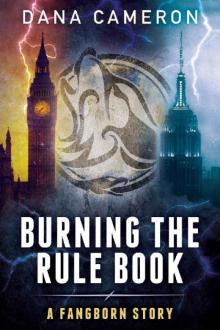 Burning the Rule Book
Burning the Rule Book Site Unseen
Site Unseen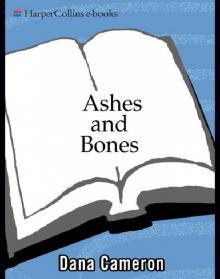 Ashes and Bones
Ashes and Bones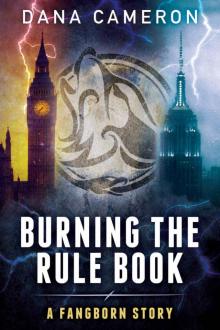 Burning the Rule Book (A Fangborn Story 3)
Burning the Rule Book (A Fangborn Story 3)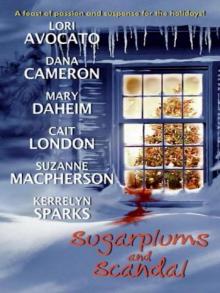 Sugarplums and Scandal
Sugarplums and Scandal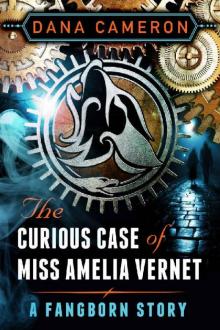 The Curious Case of Miss Amelia Vernet
The Curious Case of Miss Amelia Vernet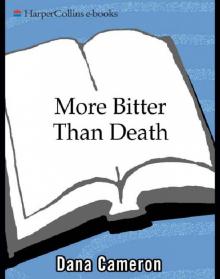 More Bitter Than Death
More Bitter Than Death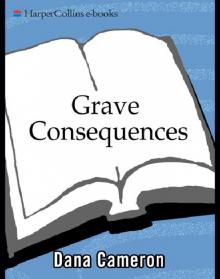 Grave Consequences
Grave Consequences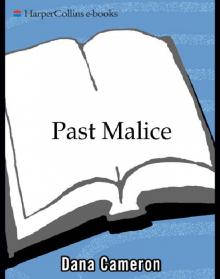 Past Malice
Past Malice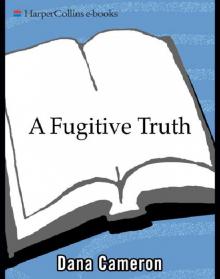 A Fugitive Truth
A Fugitive Truth Seven Kinds of Hell
Seven Kinds of Hell